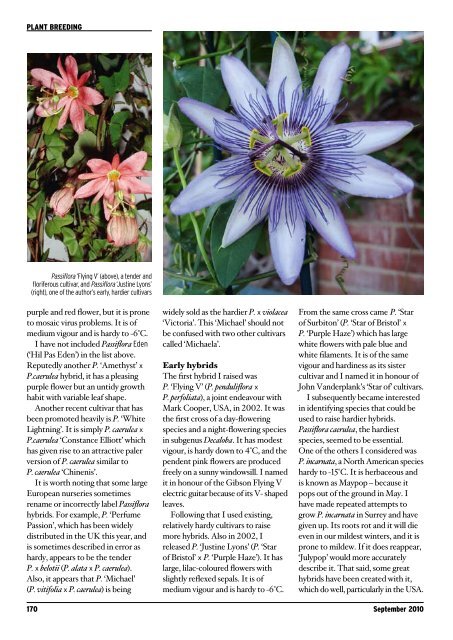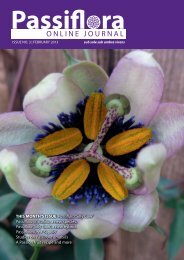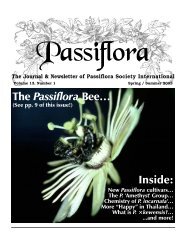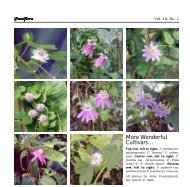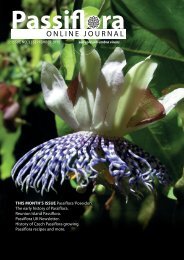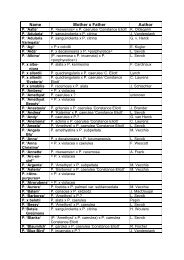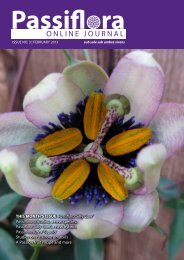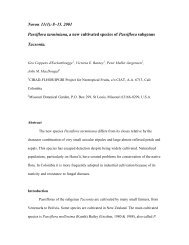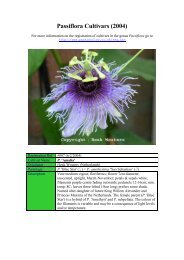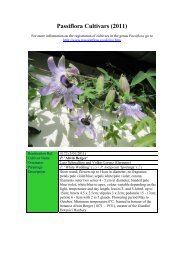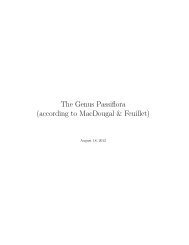Breeding hardy Passiflora - Passion Flowers
Breeding hardy Passiflora - Passion Flowers
Breeding hardy Passiflora - Passion Flowers
You also want an ePaper? Increase the reach of your titles
YUMPU automatically turns print PDFs into web optimized ePapers that Google loves.
plant breeding<br />
<strong>Passiflora</strong> ‘Flying V’ (above), a tender and<br />
floriferous cultivar, and <strong>Passiflora</strong> ‘Justine Lyons’<br />
(right), one of the author’s early, hardier cultivars<br />
purple and red flower, but it is prone<br />
to mosaic virus problems. It is of<br />
medium vigour and is <strong>hardy</strong> to -6°C.<br />
I have not included <strong>Passiflora</strong> Eden<br />
(‘Hil Pas Eden’) in the list above.<br />
Reputedly another P. ‘Amethyst’ x<br />
P.caerulea hybrid, it has a pleasing<br />
purple flower but an untidy growth<br />
habit with variable leaf shape.<br />
Another recent cultivar that has<br />
been promoted heavily is P. ‘White<br />
Lightning’. It is simply P. caerulea x<br />
P.caerulea ‘Constance Elliott’ which<br />
has given rise to an attractive paler<br />
version of P. caerulea similar to<br />
P. caerulea ‘Chinenis’.<br />
It is worth noting that some large<br />
European nurseries sometimes<br />
rename or incorrectly label <strong>Passiflora</strong><br />
hybrids. For example, P. ‘Perfume<br />
<strong>Passion</strong>’, which has been widely<br />
distributed in the UK this year, and<br />
is sometimes described in error as<br />
<strong>hardy</strong>, appears to be the tender<br />
P. x belotii (P. alata x P. caerulea).<br />
Also, it appears that P. ‘Michael’<br />
(P. vitifolia x P. caerulea) is being<br />
widely sold as the hardier P. x violacea<br />
‘Victoria’. This ‘Michael’ should not<br />
be confused with two other cultivars<br />
called ‘Michaela’.<br />
Early hybrids<br />
The first hybrid I raised was<br />
P. ‘Flying V’ (P. penduliflora x<br />
P. perfoliata), a joint endeavour with<br />
Mark Cooper, USA, in 2002. It was<br />
the first cross of a day-flowering<br />
species and a night-flowering species<br />
in subgenus Decaloba. It has modest<br />
vigour, is <strong>hardy</strong> down to 4°C, and the<br />
pendent pink flowers are produced<br />
freely on a sunny windowsill. I named<br />
it in honour of the Gibson Flying V<br />
electric guitar because of its V- shaped<br />
leaves.<br />
Following that I used existing,<br />
relatively <strong>hardy</strong> cultivars to raise<br />
more hybrids. Also in 2002, I<br />
released P. ‘Justine Lyons’ (P. ‘Star<br />
of Bristol’ x P. ‘Purple Haze’). It has<br />
large, lilac-coloured flowers with<br />
slightly reflexed sepals. It is of<br />
medium vigour and is <strong>hardy</strong> to -6°C.<br />
From the same cross came P. ‘Star<br />
of Surbiton’ (P. ‘Star of Bristol’ x<br />
P. ‘Purple Haze’) which has large<br />
white flowers with pale blue and<br />
white filaments. It is of the same<br />
vigour and hardiness as its sister<br />
cultivar and I named it in honour of<br />
John Vanderplank’s ‘Star of’ cultivars.<br />
I subsequently became interested<br />
in identifying species that could be<br />
used to raise hardier hybrids.<br />
<strong>Passiflora</strong> caerulea, the hardiest<br />
species, seemed to be essential.<br />
One of the others I considered was<br />
P. incarnata, a North American species<br />
<strong>hardy</strong> to -15°C. It is herbaceous and<br />
is known as Maypop – because it<br />
pops out of the ground in May. I<br />
have made repeated attempts to<br />
grow P. incarnata in Surrey and have<br />
given up. Its roots rot and it will die<br />
even in our mildest winters, and it is<br />
prone to mildew. If it does reappear,<br />
‘Julypop’ would more accurately<br />
describe it. That said, some great<br />
hybrids have been created with it,<br />
which do well, particularly in the USA.<br />
170 September 2010


